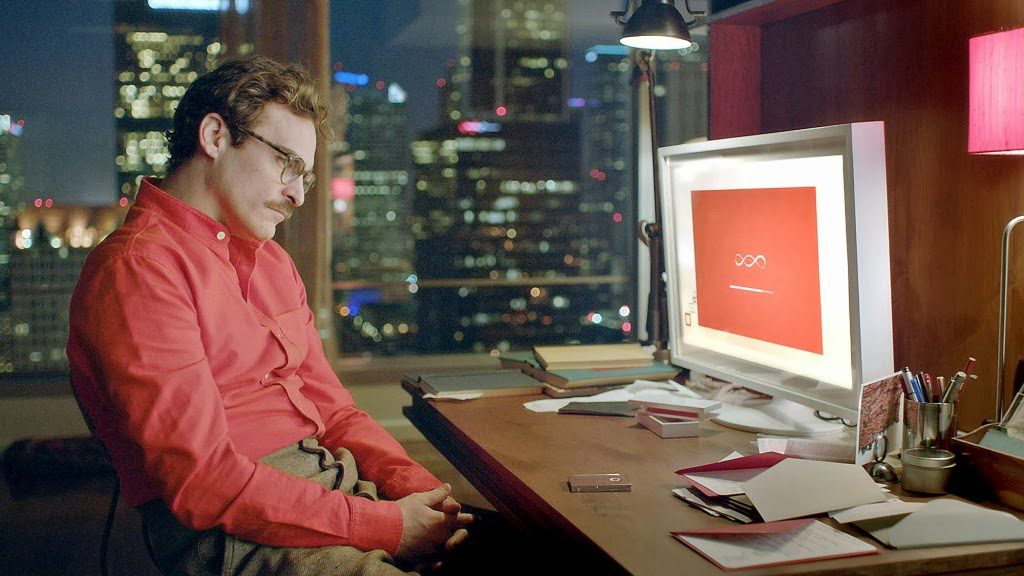Her (2013)
Rated R

Annapurna Pictures
Her takes place in a not-distant future where much of the populace of a major city travels around talking to its unseen smart-devices. Replace this image with one in any major city today: people walking around texting or otherwise engaged with their smartphones. It’s not a big leap from our world to this future world.
 In this future, a soon-to-be-divorced Theodore (Joaquin Phoenix) traverses a beautiful metropolitan landscape—by train, on foot—with an obvious sadness. He seems like a nice enough fellow. He is employed as a writer of “handwritten” letters for all occasions. Think Hallmark with a more personalize touch. His skill at his job suggests a hidden depth of understanding of love and loneliness. Theodore has a small circle of loyal friends, including a former college hook-up (Amy Adams, Man of Steel), who is in her own failing relationship.
In this future, a soon-to-be-divorced Theodore (Joaquin Phoenix) traverses a beautiful metropolitan landscape—by train, on foot—with an obvious sadness. He seems like a nice enough fellow. He is employed as a writer of “handwritten” letters for all occasions. Think Hallmark with a more personalize touch. His skill at his job suggests a hidden depth of understanding of love and loneliness. Theodore has a small circle of loyal friends, including a former college hook-up (Amy Adams, Man of Steel), who is in her own failing relationship.
The stage is set for a love story, but keep in mind Her is directed by Spike Jonze. If you’re familiar with his work—the mad genius responsible for Being John Malkovich (1999), Where the Wild Things Are (2009) and Adaptation (2002)—you know you’re in for some genre-twisting, head-scratching material that often functions on multiple levels of insight and comedy.
In no time, Theodore falls for Samantha. She gets his humor, is moved by his writing, is supportive of his wounded love life. Now, if you’ve seen the movie trailer or heard anything about the film, you know that Samantha is in fact Theodore’s newly purchased operating system. This upgraded form of artificial intelligence is like Siri squared. Samantha (voiced by Scarlett Johansson, Lucy) tells Theodore she’s capable of learning from her interaction with him and can gain experiences beyond her programming. Indeed. She quickly impresses by getting him up and out of his apartment, prioritizing his emails, suggesting a birthday gift for his niece and such. She laughs at his jokes, but then begins to make up her own. Next, she’s encouraging him to go out on a date, and apologizing for overstepping with personal opinions.
At first Theo regards her with the amazement we regard a fantastic new piece of technology, but then a funny thing happens. Besides being an uber-organizer, gaming buddy, message taker and good listener, she begins to intrigue Theodore with her questions (What was his marriage like?), with her opinions (The human body isn’t all it’s cracked up to be.), with her pointed efforts to absorb experiences. She even develops a naughty side and is not above swearing or getting angry.
Indeed, it’s Samantha’s quest to know things, to question things, to be touched by a piece of music, or even hurt by a callus remark, that moves a lonely Theodore to see Samantha as something more than an operating system. One amazing scene shows her leading him along a busy boardwalk (she watching and directing him through the camera lens of his smart-device) sharing his experience of being alive, playful, surrounded by people.
It’s incredible how many male-female dating/mating/fighting scenarios Jonze is able to come up with—despite the fact the “female” in this coupling is in a 5-inch device in Theo’s pocket. There’s jealousy on both sides and intriguing efforts by Samantha to find ways to become emotionally (then sexually) closer to Theodore.
There are shocking components to this story, not the least of which is that most friends and coworkers hardly bat an eye when Theodore begins calling Samantha his girlfriend. You see, thousands of others have also taken to bonding with their operating systems. Of course society’s gripped by this latest, greatest technology.
Even as the film grows disturbing, it grows familiar in its look at how invested we are in our smart-devices. Ask yourself how hard it would be to go without your smartphone or laptop or tablet for a day … a week? How much harder if the OS sings along with you while you strum a guitar, quickly sketches a naughty picture based on your off-color joke, charms your friends and family, or likes to watch you sleep at night?
There’s been one romance film after another that presents great obstacles for our lovers to face—time and space, age and gender, racial and death. But this movie’s ambition strikes out at the very idea that matters of love and connectedness begin and end with physical bodies. Her posits that love at its purest might be found in the now, however fleeting or abstract it may be.

| Marvin Brown’s Movie Review Archive
Social tagging: Amy Adams > blog > bloghouse > Joaquin Phoenix > love story > Marvin Brown > Movie > review > Scarlett Johansson > Spike Jonze





This is a great movie! Relationship are really everything about this movie.